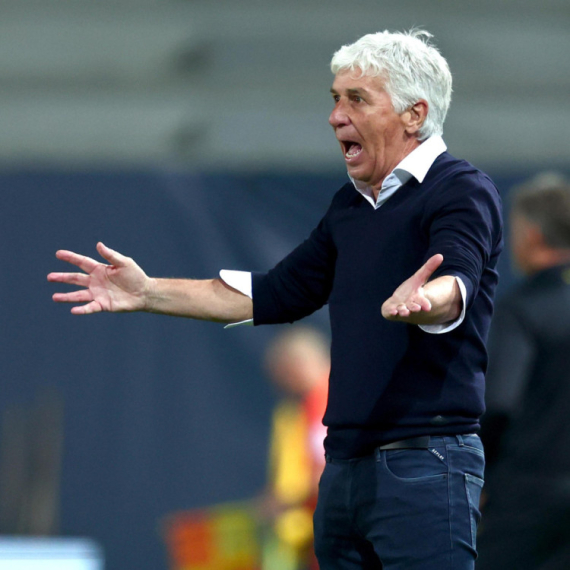EU harmonizes position on Serbian resolution
EU member-states have principally adopted “guidelines” forthe harmonization of positions with Serbia ahead of the upcoming debate in the UN General Assembly.
Tuesday, 07.09.2010.
16:26

EU member-states have principally adopted “guidelines” forthe harmonization of positions with Serbia ahead of the upcoming debate in the UN General Assembly. The Beta news agency has learned from EU officials in Brussels that the opinions of those countries which have and those which have not recognized Kosovo were harmonized. EU harmonizes position on Serbian resolution According to them, the document does not mention either Kosovo’s unilateral secession or negotiations on all open issues, which Serbia has requested. These “guidelines” will be presented to Serbian President Boris Tadic by EU High Representative for Foreign Affairs and Security Policy Catherine Ashton in order to add them or “make” harmonized positions of the EU and Serbia, to use for discussing the issue of Kosovo in the UN General Assembly. The EU member-states that have recognized the unilaterally declared independence of Kosovo made it clear that the document’s content is not in any way questioning their position that Kosovo is an independent state. The EU guidelines, which represent a compromise among the positions of the EU member-states, need to be confirmed tomorrow by the EU Political and Security Committee. According to well-informed diplomatic sources in Brussels, the most influential EU member states that have recognized Kosovo, as well as the U.S., basically still want to make the Serbian authorities choose, making it clear tht if Serbia wants to join the EU it cannot go against the majority in the EU and must give in. The solution is that the Serbian resolution, if it is not withdrawn, is such that each party can interpret it in accordance with its positions. It remains uncertain what the outcome of the debate in the UN General Assembly will be. It is still possible that a majority of the UN members, regardless of the content of the Serbian resolution, will decide that the “advisory opinion” of the International Court of Justice (ICJ) did not deal with the essence of the Kosovo issue and request a reassessment of the entire Kosovo issue before the UN Security Council. The EU27 already stated on July 22 after the ICJ opinion that they requested negotiations between Belgrade and Pristina and that they were ready to mediate along with the UN. Ashton and UN Secretary General Ban Ki-moon have already agreed to this in writing. According to the diplomatic sources in Brussels, the EU has learned that Belgrade wants to negotiate with Pristina only through the EU and UN and to determine which issues will be discussed. Belgrade does not want the situation from previous negotiations on Kosovo with Martti Ahtisaari as a mediator to repeat themselves, which Serbia believes turned out to be a cover for the final declaration of independence in Pristina, considering that the U.S. was saying all along that Kosovo would be independent. The question is whether it is acceptable for the EU and especially for the U.S. to leave a possibility to discuss the status for some final stages of Serbia’s EU accession, and “arrange” relations between Serbia and Kosovo if not solve them by a model of “two Germanies” or Great Britain and Northern Ireland. UN General Assembly (FoNet archive) Final text of resolution still unknown For most EU member-states a compromise is only talk about technical issues between two independent countries, Kosovo and Serbia. In such circumstances it is uncertain if a compromise could be made. Serbian Interior Minister Ivica Dacic says that Serbia, regardless of the result of the voting in the UN General Assembly, has to continue the policy of protecting its national and state interests and European integrations. “Serbia, despite defending its state and national interests, has to take care of relations with those who make decisions in the world today, and that means to try to find a common language and interest with those who are against our positions,” he said. As he pointed out, in the next few days Serbia will see whether this will happen, but added that Serbia is certainly ready to reach a compromise. “Serbia won’t irritate anyone in the international community with its moves, but I don’t believe that a compromise would be possible on grounds that the resolution practically contains a verification of Kosovo independence. I think that no government in Serbia would accept such compromise,” the interior minister stressed. President of the parliamentary Foreign Affairs Committee Dragoljub Micunovic has stated that one of possible solutions would be that the EU in a form of amendments proposes a different formulation of disputable parts and that Serbia then accepts these amendments and the resolution gets adopted. According to him, the second option is that Belgrade starts working on a new, joint resolution with Spain and Greece. “A Withdrawal of the resolution does not suit Serbia,“ Micunovic said.
EU harmonizes position on Serbian resolution
According to them, the document does not mention either Kosovo’s unilateral secession or negotiations on all open issues, which Serbia has requested.These “guidelines” will be presented to Serbian President Boris Tadić by EU High Representative for Foreign Affairs and Security Policy Catherine Ashton in order to add them or “make” harmonized positions of the EU and Serbia, to use for discussing the issue of Kosovo in the UN General Assembly.
The EU member-states that have recognized the unilaterally declared independence of Kosovo made it clear that the document’s content is not in any way questioning their position that Kosovo is an independent state.
The EU guidelines, which represent a compromise among the positions of the EU member-states, need to be confirmed tomorrow by the EU Political and Security Committee.
According to well-informed diplomatic sources in Brussels, the most influential EU member states that have recognized Kosovo, as well as the U.S., basically still want to make the Serbian authorities choose, making it clear tht if Serbia wants to join the EU it cannot go against the majority in the EU and must give in.
The solution is that the Serbian resolution, if it is not withdrawn, is such that each party can interpret it in accordance with its positions.
It remains uncertain what the outcome of the debate in the UN General Assembly will be.
It is still possible that a majority of the UN members, regardless of the content of the Serbian resolution, will decide that the “advisory opinion” of the International Court of Justice (ICJ) did not deal with the essence of the Kosovo issue and request a reassessment of the entire Kosovo issue before the UN Security Council.
The EU27 already stated on July 22 after the ICJ opinion that they requested negotiations between Belgrade and Priština and that they were ready to mediate along with the UN.
Ashton and UN Secretary General Ban Ki-moon have already agreed to this in writing. According to the diplomatic sources in Brussels, the EU has learned that Belgrade wants to negotiate with Priština only through the EU and UN and to determine which issues will be discussed.
Belgrade does not want the situation from previous negotiations on Kosovo with Martti Ahtisaari as a mediator to repeat themselves, which Serbia believes turned out to be a cover for the final declaration of independence in Priština, considering that the U.S. was saying all along that Kosovo would be independent.
The question is whether it is acceptable for the EU and especially for the U.S. to leave a possibility to discuss the status for some final stages of Serbia’s EU accession, and “arrange” relations between Serbia and Kosovo if not solve them by a model of “two Germanies” or Great Britain and Northern Ireland.
Final text of resolution still unknown
For most EU member-states a compromise is only talk about technical issues between two independent countries, Kosovo and Serbia. In such circumstances it is uncertain if a compromise could be made.Serbian Interior Minister Ivica Dačić says that Serbia, regardless of the result of the voting in the UN General Assembly, has to continue the policy of protecting its national and state interests and European integrations.
“Serbia, despite defending its state and national interests, has to take care of relations with those who make decisions in the world today, and that means to try to find a common language and interest with those who are against our positions,” he said.
As he pointed out, in the next few days Serbia will see whether this will happen, but added that Serbia is certainly ready to reach a compromise.
“Serbia won’t irritate anyone in the international community with its moves, but I don’t believe that a compromise would be possible on grounds that the resolution practically contains a verification of Kosovo independence. I think that no government in Serbia would accept such compromise,” the interior minister stressed.
President of the parliamentary Foreign Affairs Committee Dragoljub Mićunović has stated that one of possible solutions would be that the EU in a form of amendments proposes a different formulation of disputable parts and that Serbia then accepts these amendments and the resolution gets adopted.
According to him, the second option is that Belgrade starts working on a new, joint resolution with Spain and Greece.
“A Withdrawal of the resolution does not suit Serbia,“ Mićunović said.



















































Komentari 16
Pogledaj komentare